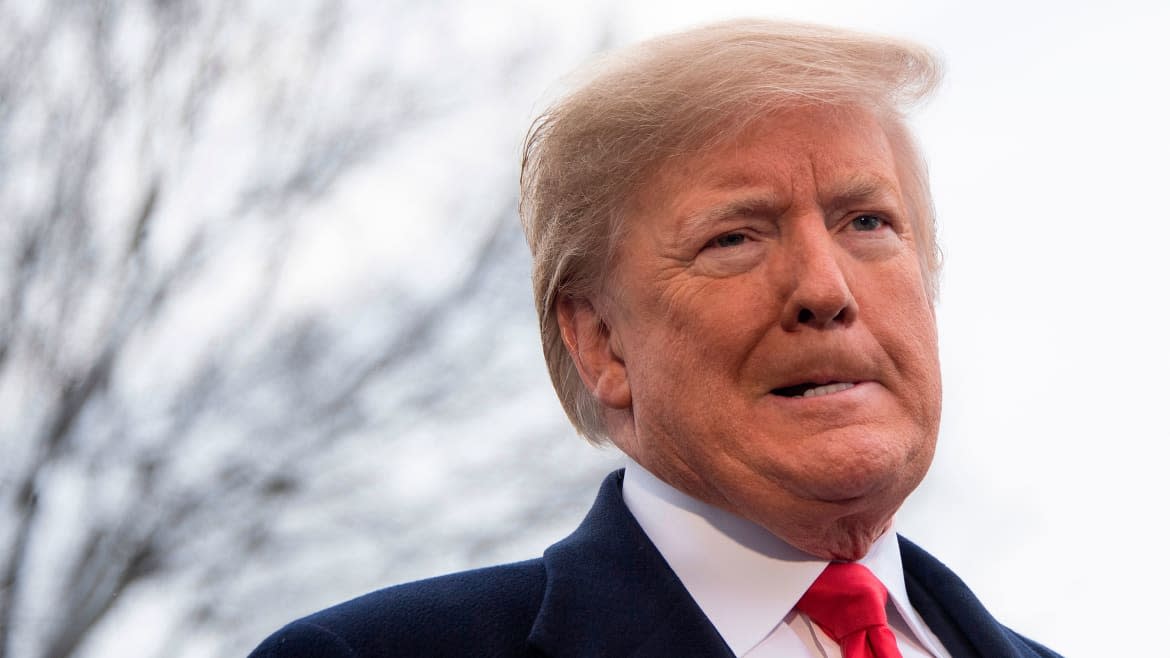Here’s How the House Can Finally Nail Trump

President Trump may complain on Twitter or Fox News that congressional investigations are a “partisan witch hunt,” “presidential harassment,” and a “disgrace,” but few judges will want to hear it.
Of course House Democrats have the legal power to obtain President Trump’s tax returns. And the full, un-redacted Mueller report. And records of Trump’s financial relations with Deutsche Bank and other lenders. And much more.
House Democrats need not ask meekly for information about Trump’s finances and the Mueller report and accept whatever Trump voluntarily provides. The power of the House and of the Senate to compel the disclosure of documents and testimony to inform the exercise of their constitutional powers is very, very well-established. “The power of the Congress to conduct investigations is inherent in the legislative process. That power is broad,” the Supreme Court said in Barenblatt v. United States. “It encompasses inquiries concerning the administration of existing laws as well as proposed or possibly needed statutes.”
“The power of inquiry has been employed by Congress throughout our history, over the whole range of the national interests concerning which Congress might legislate or decide upon due investigation not to legislate; it has similarly been utilized in determining what to appropriate from the national purse, or whether to appropriate,” the Supreme Court said in Watkins v. United States. “The scope of the power of inquiry, in short, is as penetrating and far-reaching as the potential power to enact and appropriate under the Constitution.”
Citizens are required to comply with congressional subpoenas “to testify fully with respect to matters within the province of proper investigation” just as they are required to comply with judicial subpoenas.
Trump and his political allies argue that Congress has no power to prosecute crimes, and matters under criminal investigation are none of House Democrats’ business. House Democrats have other obviously proper reasons to investigate Trump’s financial interests and the Mueller Report, however.
Congress’s investigative powers are strongest when Congress seeks to expose corruption or mismanagement in the federal government, even if the conduct under investigation is the subject of other active legal proceedings. There is ample basis to suspect that Trump has used the powers of the presidency to enrich himself.
Congress can also investigate corruption and other wrongdoing in the private sector in “surveys of defects in our social, economic or political system for the purpose of enabling the Congress to remedy them,” the Supreme Court said in Watkins, and Congress frequently has. The Senate conducted extensive hearings in the ’50s and ’60s into organized crime and union corruption. Most Americans now just remember those hearings from the Godfather movies, but the hearings resulted in significant legislation. In 1970, Congress enacted the Racketeering Influenced and Corrupt Organizations Act (RICO) to close loopholes that made criminal prosecution of crime bosses difficult and to allow private lawsuits by anyone harmed by criminal organizations. In 1974, Congress enacted the Employee Retirement Income Security Act (ERISA) partly to protect pension plans from the sticky fingers of organized crime, which controlled many union pension plans at the time.
House Democrats need not have particular legislation in mind to investigate Trump’s finances or the Mueller Report. It is not at all difficult to imagine legislation that Congress might consider to remedy “defects in our social, economic or political system” that the investigations might reveal.
Congress could enact legislation to require more financial disclosure by presidential candidates, rather than rely on the post-Watergate tradition that presidents and presidential candidates voluntarily making their tax returns public. Trump denied during the 2016 campaign that he had any financial interests in Russia, while his business was in advanced negotiations for an ambitious project in Moscow—a building that would reportedly have been the tallest in Europe. The project would have been enormously profitable to Trump. As a candidate, Trump softened the Republican Party platform’s support for Ukraine in that nation’s conflict with Russia, and spoke favorably of Russian leader Vladimir Putin, a figure not widely admired in American politics.
Many voters would like to have known in 2016 of Trump’s negotiations with the Putin government for the proposed project in Moscow.
Congress might enact more specific prohibitions or enforcement mechanisms for the Constitution’s anti-corruption provisions, the emoluments clauses, to prevent any potential for self-dealing by the President and other government officials. Conflicts of interest rules are meant to protect even honest politicians from the subtle tug of self-interest, a tug that Trump shows no desire to resist. Trump’s opulent hotel in downtown Washington has become the home away from home for officials from the world’s most repugnant regimes, despite the ready availability of comparable accommodations nearby at a fraction of the cost. Trump has been very delicate in his criticism of many of those regimes, even in the face of barbaric conduct.
Congress might close tax loopholes or increase appropriations for tax enforcement. It might revisit the independent counsel law to toughen the protection of criminal investigations from political interference.
Congress might do all of that and more or nothing at all, but information about Trump’s finances and the full Mueller Report would inform those decisions.
Trump and his political allies promise to fight congressional investigations tooth and nail, and say that their legal challenges will block any disclosures until well after the 2020 election. Trump argues that any supposed legislative purpose is a “pretext,” and House Democrats just want to inflict political damage.
The courts recognize a “presumption of the validity of government proceedings,” so that “When a committee of Congress is engaged in a legitimate legislative inquiry and the questions propounded are relevant and material to the inquiry, the courts will not question the motives of the questioner.”
In other words, if Congress has a valid legislative purpose for an investigation but also has political motives, then so what? When does Congress not have political motives?
Trump’s “pretext” argument is legally flimsy, and maybe frivolous. It’s all he’s got.

